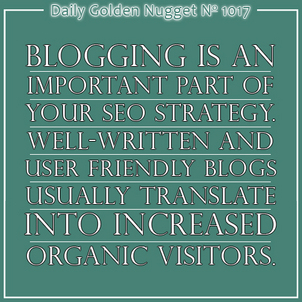
A lot has changed in the world of search engine optimization (SEO) and search engine marketing (SEM) since I first started my daily blogging more than 1000 posts ago.
The most significant SEO changes over the last 4 years are related to Google Panda and Google Penguin, but there are dozens of other notable changes, and hundreds of subtle changes throughout the entire internet.
Although I'd love to write a "then and now" post about all the internet marketing changes I know about from over the last 4 years, what I decided to do instead is list 15 things about blogging and how it relates to online marketing of today.
Here they are:
- Don't stress over word count. I'll be the first to tell you that I see more organic success with blogs of more than 500 words, but even the occasional 200 word blog can achieve success. Tell your story and ignore the word count until you're done telling it.
- Internal linking is good for your readers, and for SEO. Figure out ways to link every blog post to some other page of your site, to a product, or another blog you've already written.
- I like to include a date on every blog post so readers know when it was written. Some of my blogs from 2010 are now invalid because of technology changes, but most have evergreen content that Google gladly serves up in search results every day. If your goal is blogging to increase your business, then you should try to write your blogs so they will be as valuable 3 years from now as they are today.
- Blogging should be about storytelling, not about writing specifically to meet the needs of keywords or keyword density.
- Sharing every blog post socially will attract visitors to your blog for a few days after you've shared it. You have to pay attention to who likes your posts and who leaves a comment. Make sure to like the comments and even comment back when needed.
- You can reshare your older blog posts months after you wrote them. Don't simply reshare it but rather, explain why it's good to revisit that post again. Maybe it was something in the news, or a yearly event, or just a good blog that you felt was worthwhile to share again.
- Celebrity names always gain the most organic traffic. Use celebrity names whenever possible for things like fashion shows, runways, red carpets, or even the latest jewelry designs by celebrities. A phrase like "Meryl Streep was dazzling in Harry Winston earrings when presenting at the Golden Globes" is better off than "Renown actresses wore Harry Winston earrings while presenting at the Golden Globes." As long as you're basing off of clearly stated fact or opinion, you can use real people's names. Just don't say "Meryl Streeep bought her Harry Winston earrings at my store," unless she actually did. You can spin it as "to get the same look that Meryl had on Sunday, we have similar style earrings provided by..." if you're tying into your brand.
- It's better to include a byline on your blogs than to post anonymously. Including your name as the author of the blog post helps to surface your blogs to people using Google with personalized search turned on.
- Sharing socially to your personal account will attract more people to your blog than when shared through your business account. Always share through both, but the personal always seems to get more activity on all social networks.
- The home page of your blog won't be the most popular landing page on your site. It's likely that a different blog will have this honor every year, which is why jewelers should include some type of internal linking to other pages, products, and content on the site within every blog post.
- After writing your blog post, you should write 2 or 3 different summaries of the blog. The first summary should be used on your blog home page, the second is used when sharing on Google+, and the third is used on Facebook. This will prevent readers who follow you from being fatigued by the same blog description appearing in all 3 places, and it gives Google additional information about your blog rather than the same words appearing online in triplicate.
- Use schema.org to tag your blog posts as either Articles or BlogPosting
- Establish a schedule and stick with it. You should blog at least once a month, but my measurements show the better value comes from at least once per week.
- Your blog should be part of your website, not separate. I suggest setting up a /blog/ subdirectory under your domain name.
- Deviating too far from your general topic won't help your search engine optimization efforts, and it will attract the wrong types of organic traffic to your website.
This post is part of a series of what I've learned from writing 1000 blog posts. Maybe one of these other topics will interest you too:
* Content Tips
* Managing Your Blogging Ideas
* Writing Tips
* Editing
* Attracting an Audience
* Organization Strategy
* Search Engine Optimization (this one)








